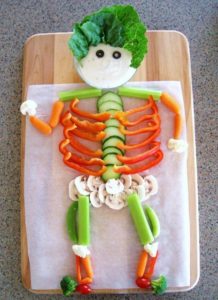
Yesterday was World Vegan Day and marks the start of World Vegan Month 1 . I didn’t notice that the traffic stopped, nor that people were cheering in the streets, but then again, I didn’t expect much at all. However, there is a discernible change in the way the media is dealing with the whole subject of plant-based eating.
Whilst I don’t tend to refer to myself as a vegan, since a vegan diet can be very far from an optimally healthy WFPB diet, the fact is that more and more media attention is focusing on the three main benefits of going plant-based:
- improving your health and potential lifespan
- protecting the environment
- stopping wide-scale animal cruelty
I put them in this order because my main thrust is concerned with improving human health. For me, the other two benefits follow naturally from an enlightened self-interest.
Most articles and videos tend to waffle on about the rights or wrongs of plant-based eating, but few seem to provide the reader with any links to the research data behind the claims.
Hopefully, today’s online Daily Telegraph article entitled Six Reasons To Go Vegan, According To Science 2 , written by Lucy Rahim, is a positive sign of things to come. I would like to share some of its main points with you.
It starts by pointing out that veganism has a lengthy list of celebrity backers (I have a problem with that ridiculous word, ‘celebrity’, but let’s not look a gift horse in the mouth), including Russell Brand, Ellen Degeneres, Natalie Portman and Samuel L. Jackson, and that there is an ever-growing list of vegan athletes, including Serena Williams, Mike Tyson and former Mr Universe Barnabas du Plessis.
However, the part that appeals to my research-based approach is that the six points the article cites as being ‘scientifically tested’ are backed up by hyperlinks to proper peer-reviewed research. Here are the six reasons in brief, with the links provided by the article.
Blog Contents
1. It can help you lose weight
A 2015 study 3 showed that those following a vegan diet lost comparatively more weight than those following omnivorous and vegetarian ones.
2. It’s good for the environment
- agriculture is one of the largest contributors to greenhouse gas emissions (more than all transport), potentially increasing to 50% by 2050, according to a 2016 Oxford study 4 which formed the basis of the link in the article 5
- rearing livestock for animal-based products requires far more land, water and energy than producing grain; 27kg CO2 is generated per kilo beef in comparison to 0.9kg per kilo of lentils (the only link here is to an earlier Daily Telegraph article by Alex Proud 6 which is, by the way, well worth reading as well)
- according to the above-mentioned 2016 Oxford study, the adoption of a vegan diet globally would cut food-related emissions by 70%
3. It might make you live longer
- numerous scientific studies have been taken to measure the impact of a plant-based diet in reducing the risk of major diseases, including:
- diabetes 7
- heart disease 8
- arthritis 9
- obesity, which affects 1 in 6 Britons and is a leading cause of death (this is not directly linked to a peer-reviewed article, but links to an earlier Daily Telegraph article 10 which uses statistics from Cancer Research UK 11
- mass-adoption of a vegan diet could cut 8.1 million deaths a year 4
4. Eating vegetables is good for you
Sadly, there are no links to peer-reviewed research mentioned in this part of the article. I guess the writer considers that it’s just so widely accepted that eating fruit and vegetables is beneficial. The article does, however, give some detail about why they are so good for us, stating that they are full of essential vitamins and minerals (including calcium, potassium and Vitamin C) and dietary fibre. They do, however, link to another Daily Telegraph article entitled “Eating fruit and veg ‘boosts attractiveness’ ” 12 , which is worth a look.
5. It makes you smell better
The article refers to a 2017 study 13 which found that the sweat of those who eat a diet of mainly fruit and vegetables was found to be more attractive to women than those on a carb-heavy diet. Looking at the study in more detail, it appears that all carbs were lumped into one group – this included breakfast cereals, breads, ‘carbohydrate foods’, sugars and spreads, and drinks, as well as legumes. By doing this, the study failed to separate what a WFPB diet would define as ‘good’ from the ‘bad’ carbs.
6. It could even make you better in bed…
The article cites a “highly disputed TV advert” released by PETA (People for Ethical Treatment of Animals), see below:
Maybe the validity of this latter claim is only something I can leave for my readers to find out for themselves, since the article only provides a link to an earlier Daily Telegraph article on this subject, entitled “Are vegans really better in bed?” 14 in lieu of references to any facts-based research.
Final thoughts
Even though this article doesn’t look into the negative aspects of eating animal foods, nor of the devastating health impacts of eating processed foods, it’s good to see that journalists are starting to cite the research data behind their claims. The more we see of this the better.
It’s much harder for uninformed and biased sceptics to hit you with arrows when you can block them with shields made of hard facts.

References
- World Vegan Month Background [↩]
- Telegraph 2nd November 2018: Six Reasons To Go Vegan, According To Science [↩]
- Nutrition. 2015 Feb;31(2):350-8. doi: 10.1016/j.nut.2014.09.002. Epub 2014 Oct 18. Comparative effectiveness of plant-based diets for weight loss: a randomized controlled trial of five different diets. Turner-McGrievy GM, Davidson CR, Wingard EE, Wilcox S, Frongillo EA. [↩]
- Analysis and valuation of the health and climate change cobenefits of dietary change. Marco Springmann, H. Charles J. Godfray, Mike Rayner, and Peter Scarborough. PNAS published ahead of print March 21, 2016 https://doi.org/10.1073/pnas.1523119113. [↩] [↩]
- Plant-based diets could save millions of lives and dramatically cut greenhouse gas emissions [↩]
- We all need to stop eating meat now, and this is why [↩]
- Diabetes Care. 2009 May; 32(5): Type of Vegetarian Diet, Body Weight, and Prevalence of Type 2 Diabetes. Serena Tonstad, MD, PHD, Terry Butler, DRPH, Ru Yan, MSC, and Gary E. Fraser, MD, PHD [↩]
- Vegetarian Dietary Patterns Are Associated With a Lower Risk of Metabolic Syndrome
The Adventist Health Study 2. Nico S. Rizzo, PHD, Joan Sabaté, MD, DRPH, Karen Jaceldo-Siegl, DRPH and Gary E. Fraser, MD, PHD [↩] - Arthritis. 2015; 2015: 708152. Published online 2015 Feb 28. doi: [10.1155/2015/708152]. Whole-Foods, Plant-Based Diet Alleviates the Symptoms of Osteoarthritis. Chelsea M. Clinton, Shanley O’Brien, Junwen Law, Colleen M. Renier, and Mary R. Wendt. [↩]
- Daily Telegraph 2 January 2016: Obesity will soon be ‘the new normal’ figures show [↩]
- Cancer Research UK Cancer Risk Statistics [↩]
- Daily Telegraph 7 March 2012: Eating fruit and veg ‘boosts attractiveness’ [↩]
- Evolution & Human Behavior. January 2017. Volume 38, Issue 1, Pages 136–143: Diet quality and the attractiveness of male body odor. Andrea Zuniga, Richard J. Stevenson, Mehmut K. Mahmut, Ian D. Stephen. [↩]
- Daily Telegraph 2 February 2016: Are vegans really better in bed? [↩]